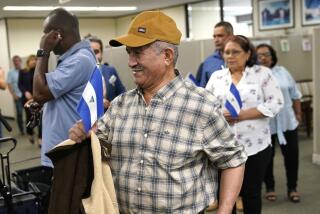Honduras Jails 2 Contras for Disobeying Order to Stay Away From Capital
TEGUCIGALPA, Honduras — A Honduran military commander has jailed two Nicaraguan Indian leaders for disobeying his orders to stay close to Nicaraguan rebel forces based in eastern Honduras, rebel and diplomatic sources said Friday.
The order to the leaders of the KISAN rebel group, which also barred them from this capital, was part of the Honduran military and government’s effort to lower the profile of the U.S.-supported contras in this country, the sources said.
In recent weeks, President Jose Azcona Hoyo has told the press that there no longer are contras in Honduras, and much of the rebels’ supply operation has been moved out of sight to one of the remote Swan Islands in the Caribbean.
The sources, who asked not to be identified, said Indian military leaders Adan Artola and Roger Herman, leader of the KISAN political commission, were detained by Col. Erick Sanchez, chief of the Honduran army’s 5th Battalion in Mocoron.
Teaching ‘a Little Lesson’
“They’re in the brig at the 5th Battalion,” a diplomatic source said. “They were told to stay out there (in the east), and they came to the capital three times. He’s teaching them a little lesson.”
“That’s right,” said a rebel source. “They don’t obey.”
Sources said Artola and Herman had been in custody at least two or three days.
“They’ll be out in a couple of days,” the diplomat said. “It’s no big deal.”
The rebel source said he believed that American advisers to the contras were working to free the two Indian leaders.
An army spokesman said he had no information on the detention. There is no telephone to the battalion headquarters in Mocoron, about 200 miles east of Tegucigalpa, and the spokesman said he was unable to reach the battalion by radio Friday.
1,000 Fighters
KISAN--an acronym for Coast Indians United in Nicaragua--is believed to have about 1,000 combatants who fight primarily in northeastern Nicaragua and along Nicaragua’s Atlantic coast. The group was formed in 1985 after Indian leader Steadman Fagoth was ousted in a violent internal conflict and was expelled from Honduras.
Diplomatic sources discounted the version of some rebels that the detention of Artola and Herman was part of a power struggle over the leadership of the rebels from the Miskito and Sumo tribes.
Artola and Herman worked closely with the U.S.-backed Nicaraguan Democratic Force, the largest rebel army, which consists mostly of Spanish-speaking Nicaraguans who fight in northern and central Nicaragua.
Followers of Fagoth recently have tried to draw support away from Artola and Herman and to organize a move to bring Fagoth back from exile in Miami. Dissidents of the Nicaraguan Democratic Force have formed a new political group with Fagoth in Miami called Condor.
A diplomatic source said that Fagoth, realizing that his efforts to return have failed, has told his supporters to begin advising Indian refugees to return to Nicaragua rather than stay in Honduras near KISAN leaders.
Advised to Go Back
Indians interviewed in Puerto Cabezas, Nicaragua, recently said that rebel leaders were advising them to return after months and sometimes years in Honduran refugee camps. Thousands of Miskito Indians have returned to Nicaragua in recent months, but it is not clear which rebel leaders if any, the civilians support. Thousands still remain in Honduras.
The Indian leaders have long battled each other for support of the Indian civilians in Nicaragua and refugees in Honduras. In the past, the refugees have said they were frightened by the sometimes violent factional disputes and complained that the rebels forcibly recruited youths into their army from the refugee camps.
Meanwhile, leaders of the United Nicaraguan Opposition, the rebel umbrella group, also are engaged in a leadership dispute in Miami during negotiations for a new and broader directorate. The Nicaraguan Democratic Force and KISAN are members of the alliance.
In Honduras this week, 2,000 students, displaced peasants and union members marched to protest the presence of the contras in Honduras. After the march Thursday night, a crude bomb exploded outside the home of Nicaraguan Democratic Force spokeswoman Adela Icaza. Officials are still investigating the explosion.
The Nicaraguan Democratic Force has infiltrated thousands of rebels into Nicaragua in recent months, but several thousand still remain in Honduras near the Nicaraguan border.
More to Read
Sign up for Essential California
The most important California stories and recommendations in your inbox every morning.
You may occasionally receive promotional content from the Los Angeles Times.










